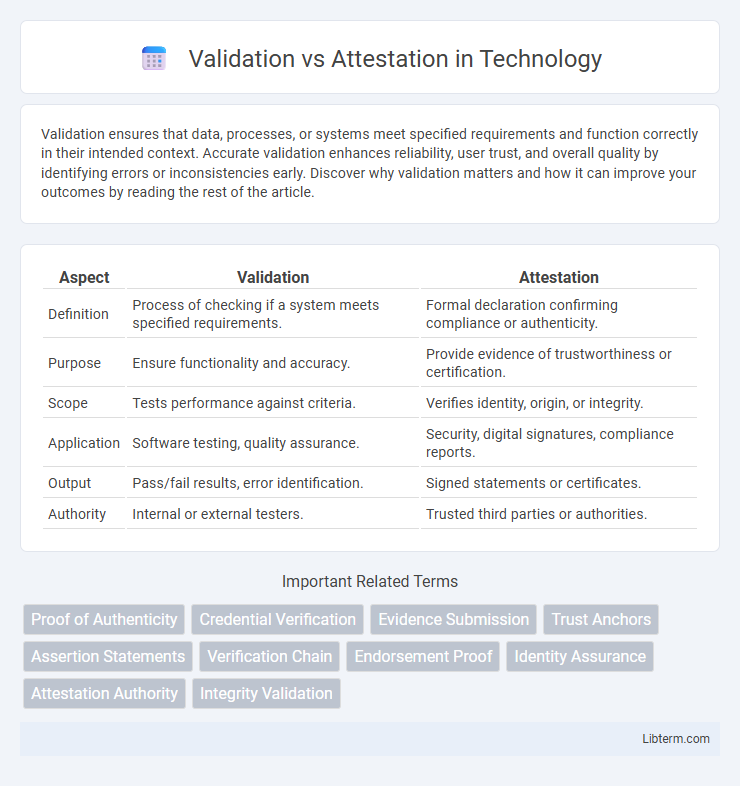Validation ensures that data, processes, or systems meet specified requirements and function correctly in their intended context. Accurate validation enhances reliability, user trust, and overall quality by identifying errors or inconsistencies early. Discover why validation matters and how it can improve your outcomes by reading the rest of the article.
Table of Comparison
| Aspect | Validation | Attestation |
|---|---|---|
| Definition | Process of checking if a system meets specified requirements. | Formal declaration confirming compliance or authenticity. |
| Purpose | Ensure functionality and accuracy. | Provide evidence of trustworthiness or certification. |
| Scope | Tests performance against criteria. | Verifies identity, origin, or integrity. |
| Application | Software testing, quality assurance. | Security, digital signatures, compliance reports. |
| Output | Pass/fail results, error identification. | Signed statements or certificates. |
| Authority | Internal or external testers. | Trusted third parties or authorities. |
Understanding Validation and Attestation
Validation ensures that a product, system, or process meets specified requirements and performs its intended function effectively under real-world conditions. Attestation involves a formal declaration or confirmation, typically by a third party, verifying that certain criteria or standards have been met. Understanding the distinction between validation and attestation is crucial for compliance in industries such as quality management, software development, and regulatory affairs.
Key Differences Between Validation and Attestation
Validation confirms the accuracy and reliability of a process, system, or product by objectively evaluating evidence against specific criteria. Attestation involves a formal declaration by an independent party that a particular assertion or statement is true, often supported by an audit or review. The key difference lies in validation's focus on performance testing and evidence collection, while attestation centers on providing an authoritative opinion or certification based on the evaluation results.
Importance of Validation in Modern Systems
Validation ensures that modern systems meet specified requirements and function correctly within real-world conditions, reducing errors and enhancing reliability. It involves rigorous testing and verification processes to confirm system accuracy, performance, and safety before deployment. Emphasizing validation minimizes operational risks and supports compliance with industry standards and regulations.
The Role of Attestation in Security
Attestation plays a crucial role in security by providing verifiable evidence that a system, software, or process meets specified integrity and compliance standards. It involves cryptographic proofs and trusted platform modules (TPMs) to ensure the authenticity and trustworthiness of components before granting access or executing operations. Unlike validation, which checks correctness against requirements, attestation establishes trust by confirming the identity and state of systems in real-time security protocols.
Use Cases: When to Use Validation vs Attestation
Validation is essential when confirming that a process, system, or product meets predefined requirements and performs its intended function effectively, commonly applied in software development, clinical trials, and manufacturing quality control. Attestation is suitable for scenarios requiring formal affirmation or certification of factual statements or compliance, such as financial audits, regulatory reporting, and legal declarations. Use validation to verify accuracy and functionality, while attestation serves to provide assurance and credibility through expert endorsement or certification.
Validation Techniques and Best Practices
Validation techniques encompass systematic testing, inspection, and analysis to ensure a system or process meets predefined requirements and specifications. Best practices prioritize thorough documentation, repeatability, and the use of automated tools for accuracy and efficiency in validation activities. Attestation involves formal certification or assertion that a system complies with standards, often relying on validation evidence but focusing on the declaration of compliance rather than the testing process itself.
Attestation Mechanisms and Standards
Attestation mechanisms rely on cryptographic proofs and trusted hardware components, like TPM (Trusted Platform Module) and Intel SGX, to verify the integrity and authenticity of software and systems. Standards such as the Trusted Computing Group (TCG) specifications and the ISO/IEC 27001 framework provide guidelines for implementing secure attestation processes in enterprise environments. Effective attestation ensures that systems meet predefined security policies by generating tamper-evident reports validated by remote parties.
Challenges in Implementing Validation and Attestation
Validation and attestation face significant challenges, including aligning processes with complex regulatory requirements and ensuring data integrity across diverse systems. Organizations struggle with the scalability of validation methods and the resource-intensive nature of attestation procedures. Limited interoperability between validation tools and attestation platforms further complicates seamless implementation and consistent compliance verification.
Future Trends in Validation and Attestation
Future trends in validation and attestation emphasize automation and blockchain integration to enhance data integrity and transparency. Artificial intelligence and machine learning are increasingly applied to streamline validation processes and detect anomalies more efficiently. Regulatory frameworks are evolving to incorporate these technologies, ensuring compliance while reducing human error in attestation practices.
Choosing the Right Approach: Validation or Attestation
Choosing between validation and attestation depends on the level of assurance required and the nature of the data or process being assessed. Validation provides a comprehensive evaluation of accuracy and completeness, ideal for verifying complex datasets or systems. Attestation offers a formal declaration of truth without in-depth testing, suitable for affirming compliance or confirming specific information integrity.
Validation Infographic

 libterm.com
libterm.com